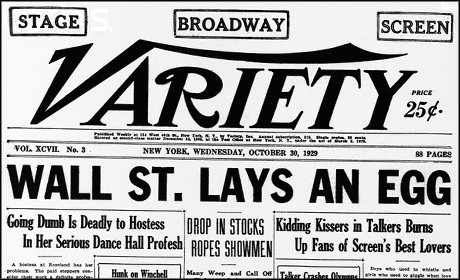
The Google News blog uses the example of the 'Wall St lays an egg' as one that would not be easily discoverable in the Google age
Google has announced a new metatag called "news_keywords" to allow digital journalists to add up to 10 keywords or phrases, the words a reader may put in to the Google search engine to find an article on that subject.
The Google News blog states that this is an additional way that Google crawlers catagorise an article for the Google search engine and Google News.
The keywords will be hidden and are all given equal value so sub-editors, SEO editors and journalists do not need to think about the order in which they place the keywords and phrases, which are separated by a comma.
The Google News help section includes the following example of code, which would be placed between < and >, to illustrate the keywords that could be used to metatag a news article about the World Cup:
meta name="news_keywords" content="World Cup, Brazil 2014, Spain vs Netherlands, soccer, football"
Mary Hamilton, deputy SEO editor at the Guardian, told Journalism.co.uk it is likely that each news outlet will have to amend its content management system to include the new metatag.
Hamilton explained that it is "too early to say how new organisations are going to implement" the changes and whether they will develop automated systems of adding keywords or if journalists will be required to manually input them for each news article.
The Google News blog states this development gives news outlets more freedom to write creative and pithy headlines, without the need for keywords. Digital journalists have been able to write different HTML title headlines (displayed in the URL), which Google reads, and on page headlines, written for the reader, for some time.
Hamilton said that headlines such as "Wall St. lays an egg", which Variety used in the 1929 to report on the Wall Street crash, would not be appropriate in the digital age. The Google New blog uses the headline as an example, describing it as a "pithy, catchy, and expressive of the substance of the story as well as the scale of its consequences".
Hamilton said: "It doesn't mean news outlets can suddenly start using print headlines on the web again."
Google News is not the only place a headline appear," she added, using social networks as an example. "And as far as we know Google will still consider the headline as as ranking factor."
The Google blog explains the development: "Similar in spirit to the plain keywords metatag, the news_keywords metatag lets publishers specify a collection of terms that apply to a news article. These words don't need to appear anywhere within the headline or body text."
It adds: "Because the metatag appears only as part of the HTML code of a page, visitors to a site won't ever see the magic under the hood."
The post points out that "this metatag will be one signal among many that our algorithms use to determine ranking".
"The news_keywords metatag is intended as a tool – but high-quality reporting and interesting news content remain the strongest ways to put your newsroom's work in front of Google News users."
Recommended reading: How to: write headlines that work for SEO
Free daily newsletter
If you like our news and feature articles, you can sign up to receive our free daily (Mon-Fri) email newsletter (mobile friendly).
Related articles
- How can journalists learn SEO and why do they need to?
- Headlines Network releases guide for covering traumatic breaking news
- Headlines Network launches free mental health training for newsroom leaders
- Tip: Write Google-friendly title tags
- What publishers need to know about the latest changes in Google search









